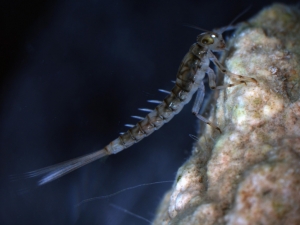Climate Change - Aquatic Insect Numbers Down by 81 Percent
Science 27.05.2020
President of the CMAS Scientific Committee, Prof. Dr. Ralph O. Schill, met Prof. Dr. Peter Haase, Head of the Department of “ River Ecology and Conservation” at the Senckenberg Research Institute and Natural History Museum Frankfurt and Dr. Viktor Baranov from the Ludwig-Maximilians University in Munich, on a “dive”...
In a study published this week in the scientific journal „Conservation Biology,” researchers studied changes in the composition of the insect fauna in a German stream.
I talked with my colleague, Peter Haase, Head of the Department of “ River Ecology and Conservation” at the Senckenberg Research Institute and Natural History Museum Frankfurt and Viktor Baranov from the Ludwig-Maximilians University in Munich about the complex and nonlinear climate‐driven changes in freshwater insect communities over 42 years.
Ralph Schill: Insect mortality is on everyone's lips, but there is a lack of scientific data, especially from aquatic insects. What is special about your study?
Peter Haase: The „Breitenbach“ in the mountains of East Hesse is considered a typical representative of a small lower mountain stream – the most common stream type in Germany and Central Europe. Nevertheless, the Breitenbach stands out among these streams! Over a period of 42 years, insect samples were taken every week, and the water flow and temperature were measured daily. It stands to reason that no other stream in the world has been subject to such long-term and frequent sampling.
Ralph Schill: What have you done with these data?
Peter Haase: Together with my colleague, Viktor Baranov, we used this unique dataset to study the development of the insect fauna in correlation with changes in the climate. Our efforts were aided by the fact that the Breitenbach is located in a nature reserve of approximately 610 hectares and is therefore far removed from direct human impact. We were thus able to pursue a central question in ecology research, i.e., what is the effect of climate change on – otherwise largely undisturbed – ecosystems?
Ralph Schill: What is the result of this long-term study?
Peter Haase: The results are significant: In the period between January 1969 and December 2010, the average water temperature rose by 1.8 degrees, and the number of insect individuals decreased by 81.6 percent. Contrary to this ‘loss of abundance,’ we recorded an overall increase in the biodiversity of the Breitenbach – this means that we have fewer individuals, but more species.
Ralph Schill: How do you explain this slight increase in species diversity?
Viktor Baranov: 42 years ago, the sampled section represented a classic upper reach of a stream. Due to the temperature increase, it is now classified as a middle reach, which generally are home to a higher number of species. However, our data also show that this trend is subject to a new turnaround – measurements from the past two decades reveal that the species diversity in the Breitenbach is declining. Again, climate change-related shifts play an important role in this regard: Since 1990, dry years have predominated, with a corresponding effect on the aquatic insects.
Ralph Schill: What does this mean for our understanding of aquatic habitats?
Peter Haase: Our study shows that climate change already has a significant impact on our aquatic ecosystems, even in areas that are otherwise mostly unaffected by anthropogenic factors. In addition, it illustrates nature’s complexity, which does not behave in a linear fashion. This can only be fully understood by means of long-term measurements like those in the Breitenbach – short-term studies or mere modeling would undoubtedly have led to clearly different results in our study area.
Ralph Schill: Thank you very much, Peter and Viktor, for this summary.
Original publication:
Baranov, V., Jourdan, J., Pilotto, F., Wagner, R. and Haase, P. (2020), Complex and nonlinear climate‐driven changes in freshwater insect communities over 42 years. Conservation Biology. Accepted Author Manuscript. doi:10.1111/cobi.13477























